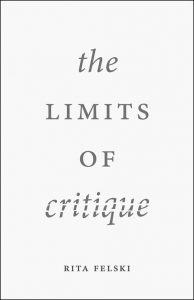Rita Felski, The Limits of Critique (Chicago, 2015)
I was in Oslo last week to give a paper as part of this group‘s seminar. One of the things I talked about was Rita Felski’s book, which has caused something of a stir. Her argument is that literary criticism and literary theory are now completely dominated by ‘‘. One way or another, the field revolves around ‘critique’, her key word for this tendency.
Readers, especially in university theory courses, are taught that they have to seek out the things that literature doesn’t want to yield: we have to detect biases, unveil ideologies, excavate abuses. She argues that this is so ubiquitous that it has become a self-involved and circular endeavour, and that we should seek out ways of defining a ‘postcritical reading’:
Rather than looking behind the text – for its hidden causes, determining conditions, and noxious motives – we might place ourselves in front of the text, reflecting on what it unfurls, calls forth, makes possible. This is not idealism, aestheticism, or magical thinking but a recognition – long overdue – of the text’s status as co-factor: as something that makes a difference, that helps makes things happen.
This sounds to me like ‘acknowledging’ the text in a way akin to things said by Stanley Cavell (whom she discusses) that I’ve discussed in the blog before, here. She is interestingly wary about some historicist approaches: ‘History is not a Box’, she says, arguing that we should think about what connects across time rather than what does not. Her main solution is to recommend an approach derived from the sociology of Bruno Latour. This requires an approach, an Actor Network Theory, that sees literary texts as ‘nonhuman actors’ working with us.

In various ways I feel sympathetic towards this. I think the book spends more time on the problems than on the solution. I also think the value of sceptical questioning is still considerable in all kinds of contexts and it may be that we need to find new ways of doing it. However, it seems right to me to think about how texts and readers work together as an alternative to seeing them as, in one way or another, at odds or in tension.
My sympathy for the argument encountered a strange obstacle when I began to wonder why the things that I and others have been doing — cognitive approaches to literature — were not mentioned significantly. As it happens, I have spent a fair bit of time with people explictly discussing alternatives to the ‘hermeneutics of suspicion’. The essay mentioned here is one of the results — admittedly quite an unobtrusive intervention, but still. Felski herself mentions affordances, and these are central to Terence Cave’s recent book Thinking with Literature (review here), but the link is yet to be made. In general, if we are looking for a transhistorical approach with an interest in the shared contexts and resources of writer and reader, then cognitive approaches have something to offer.
So I began to wonder: why isn’t it there? It may be that cognitive literary studies are simply marginal in the literary theory environment that Felski describes. Perhaps they aren’t part of the landscape because a fear of scientific hegemony puts people off. It is also true that some of the best work in cognitive theory can be linked with the culture of critique: for example, foundational work by Elizabeth Hart and Ellen Spolsky strove to demonstrate the compatibility of their approach with assumptions of post-structuralism. By focusing on indeterminacy, gaps, failings in cognition, they were also probing the underlying faultlines.
I came quite close to going back to my hotel room and e-mailing Rita Felski straight away to ask her why. It was pointed out to me that it might be hard to get the tone right, that a friendly question might seem like an accusation. It might seem like I was saying ‘why are you ignoring us?’, which I really am not. The specific contributions I refer to above are either below the radar or very recent indeed. A dose of Norwegian rain dampened my enthusiasm further. OK, it would have been a weird thing to do, but I am intrigued: work to be done, links to be forged.